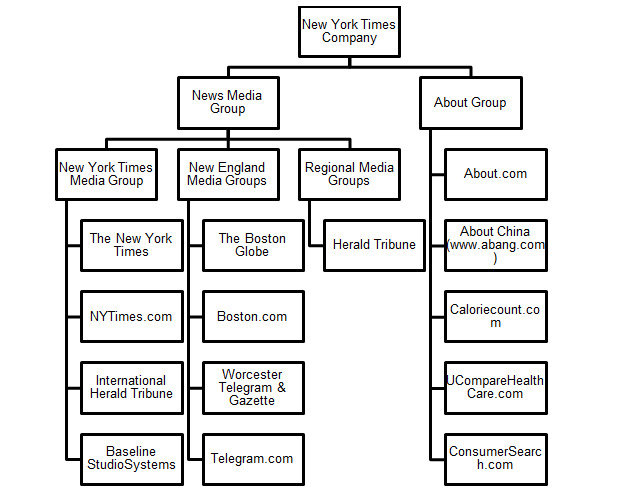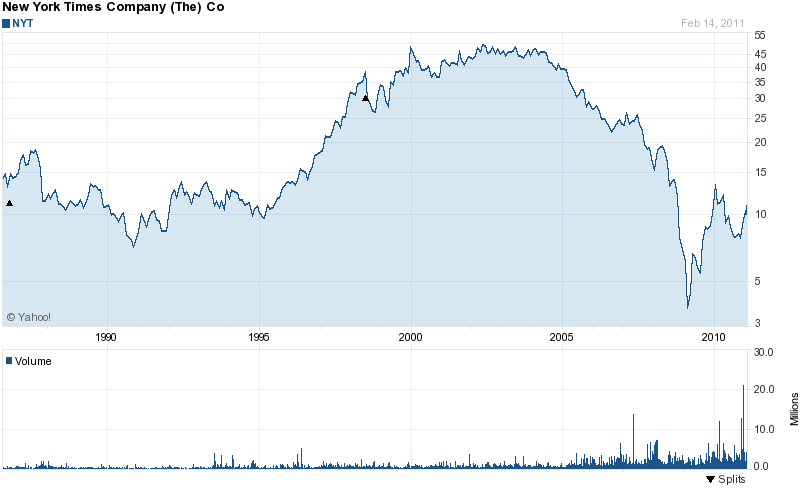Company Overview
The New York Times Company (NYT), formed on 1896, is a diversified media company that has stake in newspaper, Internet business, paper mills, and others (NYT, 2010). In 14 January 1969, NYT’s stock was first listed on American Stock Exchange (NYT, 2011).
Throughout the 1980 to 2010 NYT expanded aggressively through series of mergers and acquisitions a few prominent of which are 2002 investment in Discovery Times Channel, 1991 acquisition of International Herald Tribune, 1981 acquisition of New York Time Daily Cable TV, acquisition of Times Daily, Daily World, The Messenger, etc. in 1982, and many others. The Boston Globe was launched on 30 October 1995. More recently in 2006, it acquired Baseline Studio System and Calorie-Count.com.
In 2007, NYT formed a strategic alliance with Monster Worldwide for recruitment advertisements and acquired ConsumerSearch.com and UCompareHealthCare.com. Therefore, the company has undergone a series of changes within its businesses and strategy as it shifted its focus from the more print oriented media business to Internet based media as it started acquiring more of the .com companies with the advent of twenty-first century.
Business Overview
NYT is a diversified media company that has operated in the Unites States of America. In 2009, the revenue of the company was $2.4 billion. Broadly, it has two operating segments – News Media and the About Group (Yahoo Finance, 2011).
The Media segment of the business has New York Times Media Group, Regional Media Groups, and New England Media Groups (Yahoo Finance, 2011; NYT, 2011). The New York Times Media Group comprises of the New York Times (a daily newspaper), International Herald Tribune (a daily newspaper), and NYTimes.com.
The other areas of business under the group are Digital Archives Distribution, New York Times Index, and New York Times News Service Division. The New York Times New Service transmits photographs and news articles for The Times, the Globe, and other newspaper publications. It also delivers content for Epsilen, LLC, etc which are websites that provide education solutions.
It also distributes content for social networking websites, mobile applications, digital platforms, and owns the Baseline StudioSystem, which is a website that provides database and research services to its subscribers (Yahoo Finance, 2011). The Regional Media Groups consists of 14 regional newspapers being printed and distributed under its wing (Yahoo Finance, 2011).
It operates in the state of Alabama, California, Florida, Louisiana, North Carolina, and South Carolina. The New England Media Group operates the Boston Globe (a daily newspaper) and Boston.com (Yahoo Finance, 2011) and it has one newspaper under its wing i.e. the Herald Tribune (NYT, 2011). Figure 1 presents a more elaborate description of the business segments of NYT.
The About groups of the company operates other segments like the online business of the company that includes UCompareHealth.com, ConsumerSearch.com and CalorieCount.about.com, etc. other than these the company also holds stake in Canadian newsprint company, Metro Boston LLC that publishes daily newspaper, New England Sports Network, etc. (Yahoo Finance, 2011).
Figure 1: Business Segment of New York Times Company

The News Media Group Segment’s revenue is derived mostly from advertisements in newspapers and other online media (NYT, 2010). In 2010, the overall revenue of company was $2.39 billion (Yahoo Finance, 2011). The quarterly revenue fell by 2.9 percent in 2010 (Yahoo Finance, 2011).
There was a gross profit margin of $1.42 billion (Yahoo Finance, 2011). The profit margin of the company was 4.5 percent in 2010 and operating margin was 10.72 percent (Yahoo Finance, 2011). The source of revenue of the company has been dramatically diversified as compared to the 2005.
In 2005 the revenue earned was mostly from the print advertisements and circulation that comprised of 61 and 27 percent of the revenue respectively. However, that of digital advertisement was just 5 percent. In 2010, the share of print advertisement and circulation in revenue fell to 39 and 40 percent while that of digital advertisement increased to 14 percent (NYT, 2010).
There was an increase in digital revenue as a percentage of total revenue that increased from 12 percent in 2008 to 14 percent in 2009 to 16 percent in 2010 (NYT, 2010).
From the above overview, it is clear that the NYT belongs to the newspaper publishing services industry. the performance of NYT as compared to the industry is it ranks 71 in the industry (Yahoo Finance, 2011). The main competitors of NYT are Gannett Co. Inc. (GCI), News Corp. (NWS), and Washington Post Company (WPO).
As compared to its competitors, the revenue earned by NYT in 2010 is much less than that of GCI that is at $5.44 billion, NWS at $33.08 billion and WPO at $4.9 billion (Yahoo Finance, 2011). The number of employees working with NYT is 3,222 (NYT, 2010), and that with NWS is 51,000 and WPO is 21,500 (Yahoo Finance, 2011). The net income of NYT therefore is much less than its competitors that were $107.69 million in 2010 (Yahoo Finance, 2011).
NYT is headquartered in Midtown Manhattan in New York City. The main strategies followed by the company are to diversify its revenue with increased focused on online and digital business segment. It also aims to increase and leverage the strength of the New York Times brand and increase profitability of the circulation revenue. Further, the company aims at increasing their performance on cost and strengthens the core business areas of the company. (NYT, 2011)
Figure 2 shows the performance of the NYT’s stocks in the financial market in 1986 through 2010. The stock prices increased throughout the 1990s. it peaked in 2004. Since 2005, there has been a fall in the prices of the stock. The figure clearly shows that the prices of the company stock increased significantly in May 2010 after which it fell considerably. The stock prices hit rock bottom in 2009 due to the recession.
Figure 2: Stock Prices of NYT, source Yahoo! Finance

The New York Times is one of the leading media companies of the US. Though compared to its competitors it lacks the scale and revenue of the giants, still it is competitive to them in terms of gross and operating margin. The company has not been performing too well due to its declining stock prices since 2005.
That is why in 2009 when the stock prices fell to the maximum limit, the company adopted a strategy to diversify and therefore concentrated more on the digital revenue than on print-based revenue. This strategy reaped some success as indicated through the increasing stock prices.
References
NYT. (2011). About the Company. Web.
NYT. (2010). Annual Report 2009. Web.
NYT. (2010, December 7). UBS 38th Annual Global Media and Communications Conference. Web.
Yahoo Finance. (2011, February 14). The New York Times Company (NYT). Web.